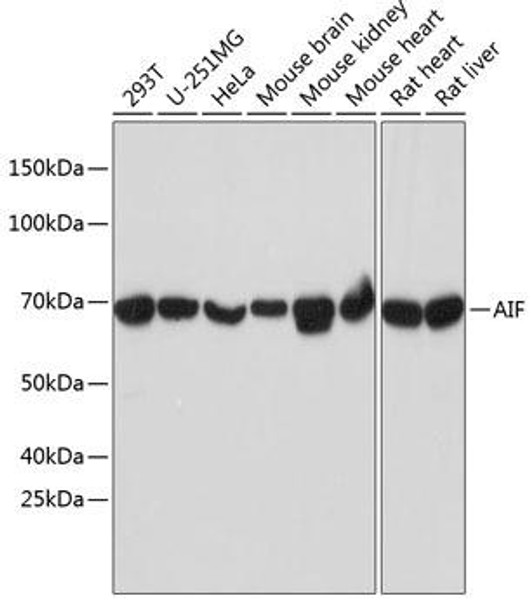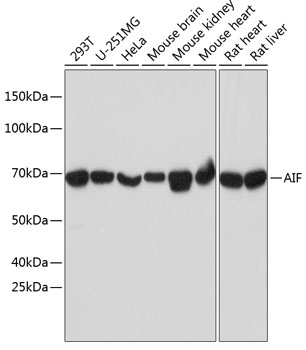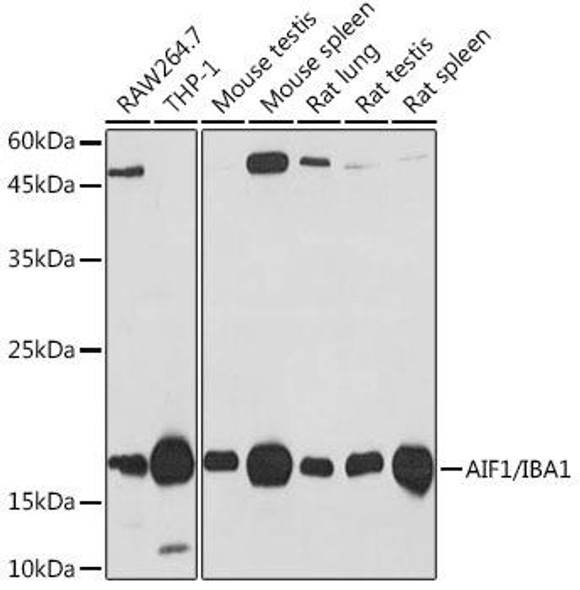Anti-AIF Antibody (CAB19536)
- SKU:
- CAB19536
- Product type:
- Antibody
- Reactivity:
- Human
- Mouse
- Rat
- Host Species:
- Rabbit
- Isotype:
- IgG
- Research Area:
- Cell Death
Frequently bought together:
Description
| Antibody Name: | Anti-AIF Antibody |
| Antibody SKU: | CAB19536 |
| Antibody Size: | 20uL, 50uL, 100uL |
| Application: | WB IHC |
| Reactivity: | Human, Mouse, Rat |
| Host Species: | Rabbit |
| Immunogen: | A synthesized peptide derived from human AIF. |
| Application: | WB IHC |
| Recommended Dilution: | WB 1:500 - 1:2000 IHC 1:50 - 1:200 |
| Reactivity: | Human, Mouse, Rat |
| Positive Samples: | 293T, U-251MG, HeLa, Mouse brain, Mouse kidney, Mouse heart, Rat heart, Rat liver |
| Immunogen: | A synthesized peptide derived from human AIF. |
| Purification Method: | Affinity purification |
| Storage Buffer: | Store at -20°C. Avoid freeze / thaw cycles. Buffer: PBS with 0.02% sodium azide, 0.05% BSA, 50% glycerol, pH7.3. |
| Isotype: | IgG |
| Sequence: | Email for sequence |
| Gene ID: | 9131 |
| Uniprot: | O95831 |
| Cellular Location: | |
| Calculated MW: | 67kDa |
| Observed MW: | 67KDa |
| Synonyms: | AIF, CMT2D, CMTX4, COWCK, COXPD6, DFNX5, NADMR, NAMSD, PDCD8, AIFM1 |
| Background: | This gene encodes a flavoprotein essential for nuclear disassembly in apoptotic cells, and it is found in the mitochondrial intermembrane space in healthy cells. Induction of apoptosis results in the translocation of this protein to the nucleus where it affects chromosome condensation and fragmentation. In addition, this gene product induces mitochondria to release the apoptogenic proteins cytochrome c and caspase-9. Mutations in this gene cause combined oxidative phosphorylation deficiency 6 (COXPD6), a severe mitochondrial encephalomyopathy, as well as Cowchock syndrome, also known as X-linked recessive Charcot-Marie-Tooth disease-4 (CMTX-4), a disorder resulting in neuropathy, and axonal and motor-sensory defects with deafness and mental retardation. Alternative splicing results in multiple transcript variants. A related pseudogene has been identified on chromosome 10. [provided by RefSeq, Aug 2015] |
| UniProt Protein Function: | PDCD8: Probable oxidoreductase that has a dual role in controlling cellular life and death; during apoptosis, it is translocated from the mitochondria to the nucleus to function as a proapoptotic factor in a caspase-independent pathway, while in normal mitochondria, it functions as an antiapoptotic factor via its oxidoreductase activity. The soluble form (AIFsol) found in the nucleus induces 'parthanatos' i.e., caspase-independent fragmentation of chromosomal DNA. Interacts with EIF3G,and thereby inhibits the EIF3 machinery and protein synthesis, and activates casapse-7 to amplify apoptosis. Plays a critical role in caspase- independent, pyknotic cell death in hydrogen peroxide-exposed cells. Binds to DNA in a sequence-independent manner. Interacts with XIAP/BIRC4. Interacts (via N-terminus) with EIF3G (via C-terminus). Belongs to the FAD-dependent oxidoreductase family. 4 isoforms of the human protein are produced by alternative splicing. |
| UniProt Protein Details: | Protein type:Apoptosis; EC 1.-.-.-; Mitochondrial; Oxidoreductase Chromosomal Location of Human Ortholog: Xq26.1 Cellular Component: cytosol; mitochondrial inner membrane; mitochondrial intermembrane space; mitochondrion; nucleus Molecular Function:NAD(P)H oxidase activity; oxidoreductase activity, acting on NADH or NADPH; protein binding Biological Process: apoptosis; caspase activation; chromosome condensation; positive regulation of apoptosis Disease: Deafness, X-linked 5 |
| NCBI Summary: | This gene encodes a flavoprotein essential for nuclear disassembly in apoptotic cells, and it is found in the mitochondrial intermembrane space in healthy cells. Induction of apoptosis results in the translocation of this protein to the nucleus where it affects chromosome condensation and fragmentation. In addition, this gene product induces mitochondria to release the apoptogenic proteins cytochrome c and caspase-9. Mutations in this gene cause combined oxidative phosphorylation deficiency 6 (COXPD6), a severe mitochondrial encephalomyopathy, as well as Cowchock syndrome, also known as X-linked recessive Charcot-Marie-Tooth disease-4 (CMTX-4), a disorder resulting in neuropathy, and axonal and motor-sensory defects with deafness and mental retardation. Alternative splicing results in multiple transcript variants. A related pseudogene has been identified on chromosome 10. [provided by RefSeq, Aug 2015] |
| UniProt Code: | O95831 |
| NCBI GenInfo Identifier: | 13431764 |
| NCBI Gene ID: | 9131 |
| NCBI Accession: | O95831.1 |
| UniProt Secondary Accession: | O95831,Q1L6K4, Q1L6K6, Q2QKE4, Q5JUZ7, Q6I9X6, Q9Y3I3 Q9Y3I4, A4QPB4, B1ALN1, B2RB08, D3DTE9, |
| UniProt Related Accession: | O95831 |
| Molecular Weight: | 26,033 Da |
| NCBI Full Name: | Apoptosis-inducing factor 1, mitochondrial |
| NCBI Synonym Full Names: | apoptosis inducing factor mitochondria associated 1 |
| NCBI Official Symbol: | AIFM1 |
| NCBI Official Synonym Symbols: | AIF; CMT2D; CMTX4; COWCK; DFNX5; NADMR; NAMSD; PDCD8; COXPD6 |
| NCBI Protein Information: | apoptosis-inducing factor 1, mitochondrial |
| UniProt Protein Name: | Apoptosis-inducing factor 1, mitochondrial |
| UniProt Synonym Protein Names: | Programmed cell death protein 8 |
| Protein Family: | Putative apoptosis-inducing factor |
| UniProt Gene Name: | AIFM1 |



![Anti-AIF Antibody (CAB2568)[KO Validated] Anti-AIF Antibody (CAB2568)[KO Validated]](https://cdn11.bigcommerce.com/s-39x6lpnvxv/images/stencil/590x590/products/23069/21260/anti-aif-antibody-cab2568ko-validated__87475__48377.1644253309.jpg?c=1)



